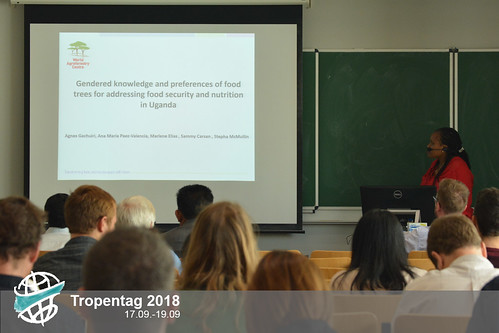Oral presentations 2018
Ebola outbreak: don’t blame only bush meat
Tue, 09/18/2018 - 17:19 — Onu EkpaIn Sierra Leone, Guinea and Liberia, the recent Ebola virus (EBOV) outbreak was devastating and led to more than 10,000 death. But who or what should we blame? - wild, domestic animals or both ...? That is the question Juliet Jabaty from Sierra Leone Agricultural Research Institute tries to find answers to. She agrees that bush animals such as bat and monkey are the major reservoir of EBOV but more animals could be culprit in cases reported. This critical research gap is yet to be filled hence Juliet researched on “The Role of Livestock and Wildlife in the Biology of Ebolaviruses”. She hypothesized that pigs, dogs and some ruminants can serve as reservoir for transmission of EBOV.
Why do women prefer mango?
Tue, 09/18/2018 - 17:00 — huidobroBelieve it or not, there are gender preferences for fruit producing trees! This is what Agnes Gachuri, from the World Agroforestry Center (ICRAF), presented in one of the oral presentation sessions at Tropentag 2018. It is known that the fruit producing trees have an important role in rural livelihoods and food security. But when it comes to which kind of trees to cultivate, the farmers have to make a decision. They are the ones that have local knowledge and prioritize the species cultivation, as well as household use. However, sometimes farmers fail to consider the potential of local varieties due to market demand, lack of seed availability, or knowledge transfer.
Africa indigenous vegetables face extinction!
Tue, 09/18/2018 - 14:41 — Onu EkpaKenya like many other African countries faces double nutrition burden – undernutrition and over-nutrition. The former is due to inadequate nutrient intake and the latter could be attributed to changes in lifestyle such as consumption of western food junks coupled with a sedentary lifestyle, paraphrased from Anne Aswani Musotsi’s presentation. Anne is from Jomo Kenyatta University of Agriculture and Technology, Kenya and she presented on – “African Indigenous Vegetables (AIV) Contribution Towards Food Security and Safety in Kenya: A Meal Cultures Perspective”. She mentioned that AIV could ensure nutrition security but unfortunately the consumption is low and many of the vegetables are going into extinction. This is counterintuitive especially in a society with malnutrition and millions of people suffering from avoidable and irreversible nutritional consequences. AIV consumption is very low. Due to changes in cultural practices over the years, people eat other crops and shifted attention from indigenous vegetables – colonial influence paradigm.
Eat egg during pregnancy, get a stupid baby
Tue, 09/18/2018 - 13:44 — Onu EkpaThe title sounds very strange but it is a perception in some regions in Africa including the upper region of Gambia. Taboos during pregnancy are one of the many forms of food taboos present in Africa, influencing consumption pattern and food habit. Therefore, it is imperative to consider the cultural elements of the people in every intervention to ensure optimal impact. This thought was considered in Céline Termote’s research on “Role of Biodiversity in Improving Dietary Diversity and Quality of Complementary Foods for Infants and Young Children in Southern Benin”.





